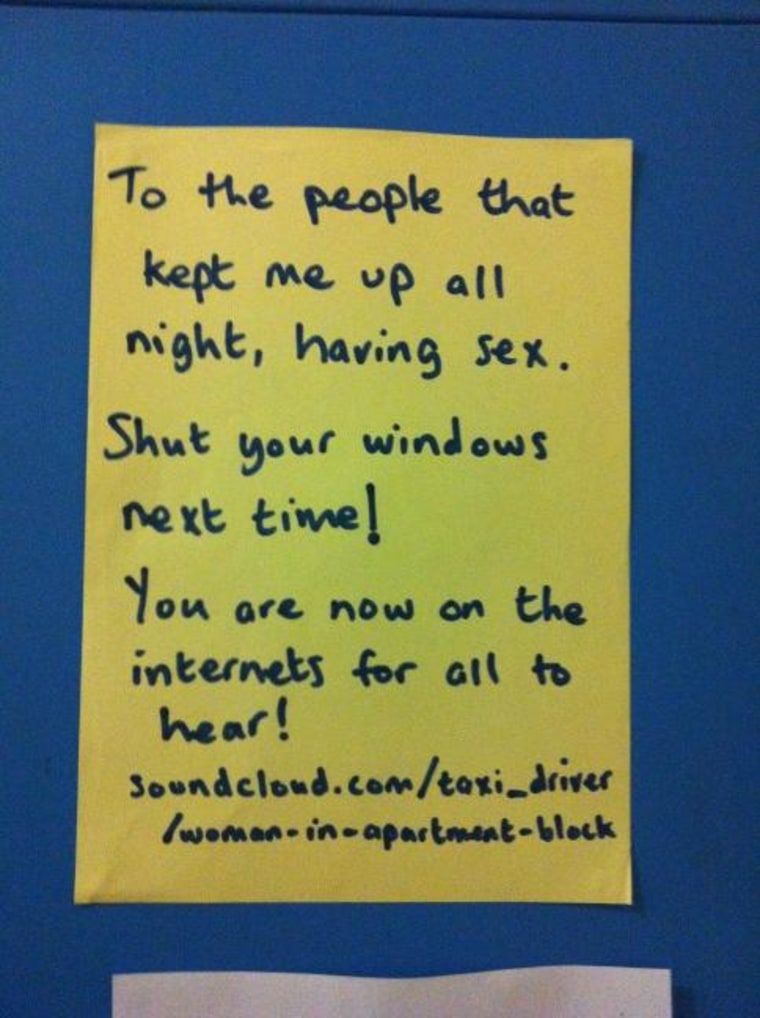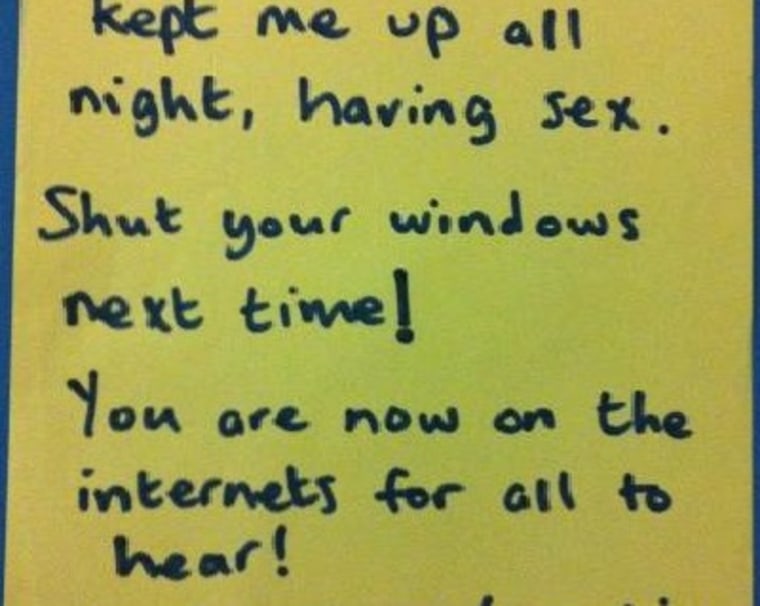
A recent post by a Reddit user who shared a friend's cyber-savvy solution for noisy neighbors having sex attracted almost 2,000 comments. To teach the loud lovers a lesson, the friend reportedly recorded the cries of passion (along with someone shouting for the couple to shut up), uploaded the recording to "social sound platform" SoundCloud, then posted a note on the offending neighbors' door telling them exactly what happened.
"This is really tapping into SoundCloud's full potential," wrote one commenter.
"That was, without a doubt, the worst Ke$ha song I've heard yet," wrote another. "It's like she's not even trying anymore..."
Hilarity continued to ensue. One Redditor even remixed the NSFW sounds into a dubstep before SoundCloud removed the naughty noises from its site. Of course, the recording clearly violated SoundCloud's terms of service, which prohibits content that is "abusive, libelous, defamatory, obscene, racist, sexually explicit, ethnically or culturally offensive, indecent" — you get the picture. What's not so clear, however, is whether recording your neighbors having sex and then posting it on the Internet is breaking the law.
SoundCloud is a new platform, but shaming neighbors by sharing their sex sounds on the Internet is nothing new — neither is the question of its legality. Way back in 2010 (half a century in Internet years), one such sleep-deprived netizen crowdsourced Yahoo! Answers with the very same question:
Is it illegal to record neighbors having sex and put it on the internet?JUST THE NOISE not the sex.
There was no real consensus, but no shortage of opinions, ranging from noisy culprits having no expectation of privacy and a suggestion to sound proof with foam board, as well as one request to record the neighbors and "send it to me haha."
"You shouldn't put it on the Internet," wrote one Yahoo commentator named Jack. "But you can get away with it as long as they aren't identified. Putting it on their door is not okay, as they will then press charges for spying and blackmail."
Forget that infamously unreliable forum; even experts like Mark Rasch, former head of the United States Department of Justice computer crime unit, told me that there's no clear answer.
"You could possibly make a crime out of it under the federal wiretap law," known formally as the Electronic Communications and Privacy Act, explained Rasch, who is now director at CyberSecurity and Privacy Consulting, CSC. "But I'm not aware of any cases where someone is capable of being heard in the public has been prosecuted," he said in an interview.
As Jeff Hermes, director of the Digital Media Law Project, Berkman Center for Internet & Society told me, "As soon as you get past the federal wiretap law, you're entirely dealing with state-by-state laws about concealed recording." Some states require only one person be aware the conversation is being recorded; in other states, both parties must know. Here's a state-by-state guide reporters use for that very reason.
Both Rasch and Hermes deem criminal prosecution iffy, and they don't put much stock in a civil lawsuit, either. That's because of a bit of tort law, which covers behavior that isn't necessarily illegal, but still causes unfair suffering. In this case, legal eagles might look at "intrusion upon seclusion":
One who intentionally intrudes, physically or otherwise, upon the solitude or seclusion of another or his private affairs or concerns, is subject to liability to the other for invasion of his privacy, if the intrusion would be highly offensive to a reasonable person.
"It's an interesting factual question," noted Hermes. "Maybe there was an intent to inflict emotional distress and cause embarrassment," what with the note posted on the door. "But nobody else could tell who it was (on the recording) so how could it cause embarrassment? The result would vary depending on how individual states interpret their common law torts."
But did the loud couple in question have an expectation of privacy? Not so much.
"Obviously people engaged in intimate activity don't expect that they will be recorded, but if you live in apartment with thin walls, you run the risk of not only that your neighbors will hear you but that their observations may find their way to the Internet," Rasch said.
So recording your neighbors having sex and posting it on the Internet: Legal or not?
"It's probably offensive and silly and all that stuff, but probably not a crime," concluded Rasch.
So there you have it. Facebook, Google, Anonymous, the feds, recently deposed "revenge porn" czar Hunter Moore … we worry so much about how larger-than-life entities might — legally or illegally — exploit us on the Internet. We can lock down our privacy settings, encrypt our nude pictures or stay off the Internet entirely. Yet as the Reddit post reminds us, the business we fail to keep private can be exploited at the hands — and recording devices — of our very own neighbors. And there really isn't much we can do about that.
Helen A.S. Popkin goes blah blah blah about online privacy, then asks you to join her on Twitter and/or Facebook. Also, Google+. Because that's how she rolls.
